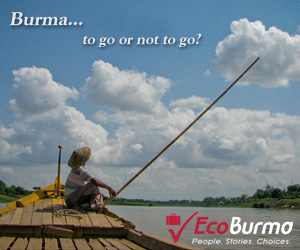Was hat die deutsche Außenpolitik nur gegen Aung San Suu Kyi? Ist das ein Erbe der DDR, die eine Uniform jedem Dissidenten vorgezogen hat? Hat sich über Sprachlehrer und Akademiker ein gewisses Naserümpfen über ein für deutsches Befinden sehr ordnungsfremdes, emotionales und oft in sich inkonsistentes Verständnis von Demokratie bei birmanischen Aktivisten bis in die Ebenen der Diplomatie und Wirtschaftsstrategen forgetragen, wo es auf ein ohnehin schon nicht ganz einfaches Verhältnis zur Basisdemokratie getroffen sein mag?
Der Artikel “The Eye of the Storm” von Aung Zaw, dem Chefredakteur vom Irrawaddy, beschreibt es so vielsagend, dass ich es hier einfach (übersetzt) zitiere:
Zusätzlich zum Drängen auf internationale Unterstützung für Thein Sein und seine neue Regierung waren Einige in der internationalen Gemeinschaft bemüht, Suu Kyi in die Bedeutungslosigkeit zu drängen. Tatsächlich hat der deutsche Botschafter in Birma, Julius Georg Luy, monatelang versucht gehabt, Suu Kyi auf den selben Platz zu verweisen wie Vertreter kleiner demokratischer Parteien, denen Birmas Militärregime erlaubt hatte, in den vorgetäuschten Wahlen Parlamentssitze zu gewinnen, um ihnen so Legitimität zu verleihen.
Am 14. März hielten die europäischen Botschafter in Birma ein Treffen hinter geschlossenen Türen ab, um über ihre Positionen bezüglich der damals anstehenden Neubewertung der EU-Sanktionen zu diskutieren. Wie eine gut informierte Quelle verraten hat, hat sich der deutsche Botschafter dagegen ausgesprochen, Suu Kyi’s Namen in offiziellen EU-Verlautbarungen zu erwähnen.
Luy sei, so der Artikel, auch gegen ein gesondertes Treffen mit Suu Kyi – immerhin die unangefochtene Oppositionsführerin und Siegerin der letzten demokratischen Wahlen im Land – gewesen. Der Eindruck drängt sich folglich auf, dass hier die deutsche Diplomatie versucht, sich beim Regime durch besondere Stromlinienförmigkeit hervorzutun.
Es ging hier ganz eindeutig nicht darum, den Dialog jenseits von Suu Kyi zu erweitern oder einen naiven und kontraproduktiven Personenkult um ihre Person zu vermeiden – beides sehr legitime Ansinnen. Dem damaligen Diktator Than Shwe war sie ein Dorn im Auge, so dass nun einige, statt den Diktator zu bekämpfen, vielmehr versuchten, den Dorn zu beseitigen. Warum?
Vielleicht sind es ganz banale wirtschaftliche Interessen, es geht um Geld und den deutschen Komplex, den man seit dem Ende des Zweiten Weltkrieges mit seiner ökonomischen Superpotenz zu heilen versucht, mit Qualität Made in Germany und Export(ex)weltmeistertiteln. Wo immer in der Welt die Kolonialmächte verschwunden sind, dort kommt nun die Nation, die mit ihren Kolonien immer in der zweiten Liga hat spielen müssen. Vielleicht aber ist es auch ganz einfach nur eine Obrigkeitsethik, der zufolge jede Autorität ein Beleg von Erfolg ist und somit ihre Legitimität im Sinne des Leistungsdenkens automatisch in sich trägt. Und jede Junta und ihre demokratischen Fassaden erfüllen natürlich auch die Sehnsucht nach Ordnung und berechenbaren Zuständen.
Dies sind nur ein paar unverbindliche Erklärungsversuche, die mir einfallen, wenn ich die Motive für den Versuch, die Dissidentin politisch auszuschalten, zu verstehen versuche. Der Begriff “vorauseilende Gehorsamkeit” fällt mir ein – leider wohl noch immer ein peinliches Stück deutschen Kulturgutes. Wenn Birma eines Tages zur wirklichen Demokratie finden wird, dann wird man als Deutscher wohl nur sehr kleinlaut – oder mit dickem Portemonnaie – ins Land reisen können. Erwartungsgemäß eher mit dickem Portemonnaie.
Related Posts:



















